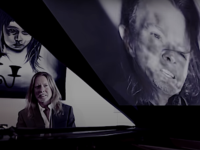With Happy Daze, singer/songwriter Steve Macfarlane whisks us back to the lushly sophisticated melodies of Burt Bacharach and Neil Sedaka, perhaps his clearest inspiration. It’s a tricky thing, since both so often risked sounding mushy or maudlin, but Macfarlane is largely successful at recreating their timeless pop sensibility.
Macfarlane, co-owner of Liverpool, England’s Parr Street Studios (where Coldplay recorded its first trio of albums), begins on an elegiacal note with “Cherry Blossom,” alone with Billy Hui at the piano.
The lyrics, inspired by Liverpool poet and biographer Peter Grant, paint an impressionistic portrait of the hoped-for turning of seasons from frigid desolation to the warm burst of spring. Steve Wright adds a sensitive orchestral backing, recalling the formal, never obvious work of producer George Martin with the Beatles. It pairs well with Mcfarlane’s subsequent “Never the Right Time,” a gently swinging AM-ready pop song that features Wright and Gary Millar in a layered vocal arrangement.
“Cliché Time” is presented twice, first in an up-tempo mix and then later as an acoustic number. The results couldn’t be more different. Perhaps as expected, the lyric skips along through a seemingly endless string of frayed old sayings, such as “the pen is mightier than the sword,” “you’d avoid me like the plague,” and so on. (Macfarlane even references Sedaka, quipping “it’s not true; breaking up is very easy to do.”) Yet “Cliché Time” overcomes that leaden familiarity on the first listen with a winking pop sensibility, courtesy of Wright’s sparklingly effusive orchestral track. The second take is a different matter, though, as we’re left with nothing more than Hui, Macfarlane, and those clichés. Whereas the first attempt sounded cheeky, and maybe a little ironic, the bare-bones sequel feels more like a show tune that’s trying too hard.
The subsequent “All the Tea in China” is again presented in two versions, as Millar fine tunes a second Asian-influenced, polyrhythmic mix. Macfarlane displays a quivering vulnerability, adding just the right baroque emotion. There’s an interesting twist at the end when the main character realizes that his lover has, yes, actually traded him for all of the tea in China. But both takes go on a bit too long, given their unusual and plodding beat structure. “Autumn Encounter” then travels half way around the world to a French café, with the lilting lyric and romantically wheezing accordion to match.
A gentle island feel propels “Heart Scare,” this lonely plea for connection from a partner who hasn’t left but is not completely in the moment, either. Wright envelops Macfarlane in a pillowy wash of strings and then joins Macfarlane and Millar again for what becomes a soaring chorus. It’s one of the more effective moments on Happy Daze, which was produced by Wright at Y Dream Studios in Wales.
Hui switches to a feverishly insistent piano signature on “Recurring Dream,” sounding something like early Billy Joel. Wright is particularly effective, coloring each successive stanza with a series of delicately wrought flourishes as Macfarlane, left on the platform as his train disappears in the distance and leaves him to contemplate other missed opportunities. Macfarlane doesn’t do much with the nostalgic interlude “Remember When,” but bounces back impressively with “Sideboard Picture.”
The tune is part of a closing pair of triumphs that hint anew at Macfarlane’s impressive range, taking him far beyond the shag-carpeted 1970’s. On “Sideboard,” he uncovers a canny ability to connect with the timeless folk-opera style of George Gershwin, but to also make it sound new. The happy-go-lucky “Two Moons” then concludes Happy Daze with a snazzy Tony Bennett-style swing. As Hui shows off a bluesier sensibility at the keys and Macfarlane loosens his tie, there is the sense that sounding like Sedaka is only the very beginning of where this partnership can go.
[amazon_enhanced asin=”B004FCG1XE” container=”” container_class=”” price=”All” background_color=”FFFFFF” link_color=”000000″ text_color=”0000FF” /]
- How Deep Cuts on ‘Music From Big Pink’ Underscore the Band’s Triumph - July 31, 2023
- How ‘Islands’ Signaled the Sad End of the Band’s Five-Man Edition - March 15, 2022
- The Band’s ‘Christmas Must Be Tonight’ Remains an Unjustly Overlooked Holiday Classic - December 25, 2016




